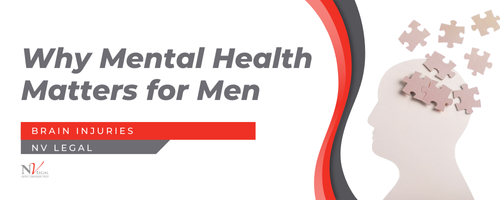Why Men Struggle in Silence After a Brain Injury
A brain injury can turn life upside down in an instant. The impact can be particularly profound for men, physically, mentally and emotionally. Social expectations, personal identity, and the pressure to ‘be strong’ often make it harder for men to talk about their struggles.
We understand the challenges that follow a brain injury, not just in terms of legal and financial support but also the psychological effects that can persist long after the injury itself.
We recently attended a seminar hosted by Mark Pitts, senior clinical manager at N-Able Services, where he discussed the link between brain injuries and mental health in men. N-Able Services is a case management company under the umbrella of the Frenkel Topping Group. It provides rehabilitation services to those affected by serious and catastrophic injuries and is an established leader in providing case management services to claimant and defendant instructing parties.
The insights shared in the seminar reinforced what we have seen in our work: Men with brain injuries often struggle in silence. We look at the mental health challenges faced by men after a brain injury, the risks associated with untreated psychological distress, and the support available.
The Mental Health Impact of Brain Injuries
A brain injury does not just affect memory, coordination, or speech. It can also change emotions, behaviour, and self-perception. According to research shared at the seminar:
- 35% of men experience depression following an acquired brain injury (Association of British Insurers)
- 25% develop an anxiety disorder
- 20% experience emotional instability, also known as ‘emotionalism ’, where they may cry or laugh more easily than before
- Apathy (lack of motivation) without depression affects 20% of men with a brain injury
- Cognitive impairment is reported in 25% of cases
These figures highlight that mental health challenges are not the exception but a common part of life after a brain injury.
Why Is Mental Health a Bigger Challenge for Men?
Many men struggle to discuss their mental health, often due to societal expectations. Traditional roles of being a ‘breadwinner’ and ‘protector’ can lead to feelings of guilt, frustration, and shame when these roles are no longer possible after an injury. Everyday emotional struggles include:
- Feeling ‘less of a man’ due to loss of work, status, or independence
- Anger and frustration at others, at themselves, or at the situation
- Social isolation, particularly if relationships break down or friends drift away
- Poor coping mechanisms, such as using alcohol or withdrawing from loved ones
- Limited access to services, particularly when mental health support is not easily accessible
The Risk of Suicide and Self-Harm in Men with Brain Injuries
Men are already at a higher risk of suicide than women. In the UK, four times as many men die by suicide compared to women. This risk is even higher for men with a brain injury.
A study by the University of Copenhagen tracked male and female brain injury survivors over 15 years. The findings were alarming:
- Men with a brain injury were 4.1% more likely to die by suicide than those without a brain injury
- 8% of suicides in the study were male
- The most at-risk group were men with brain injuries
The reasons for this are complex. Loss of identity, reduced income, relationship breakdowns, and limited access to mental health services all contribute. However, one crucial point raised at the seminar was that simply asking about suicide does not increase the risk. Having open conversations about suicidal thoughts can be a vital step in preventing them from becoming actions.
Understanding and Supporting Men After a Brain Injury
Every man’s experience with brain injury is different. However, some key approaches can help:
- Recognise warning signs
Statements like the following may indicate a more profound struggle:
“It’s hopeless… I can’t cope anymore.”
“I’m not a man anymore; all I do is clean and cook all day. I’m of no use anymore”
“I feel lonely… what’s the point of it all?”
If someone expresses these thoughts, it’s essential to take them seriously and explore what support they might need.
- Understand the ‘double-edged sword’ of insight
Some men with brain injuries lack awareness of their new limitations, which can lead to frustration. Others gain full awareness of what they have lost, which can be equally distressing. Understanding their emotional responses is key to supporting them effectively.
- Create ‘normal’ conversations
Use familiar activities and interests to engage men in discussions about their mental health. For example, one brain injury survivor was resistant to support until conversations happened in his garage while working on his car – an environment where he felt comfortable.
Finding ways to engage men in spaces where they feel at ease can make all the difference.
- Tailor support to the individual
Not every solution will work for every man. It’s important to ask questions such as:
What was their personality like before the injury?
What coping mechanisms did they use previously?
Can we replicate or adapt those coping strategies?
What format of communication do they respond best to?
A ‘one size fits all’ approach does not work. Support must be personalised to their needs.
- Encourage open conversations about mental health
Breaking the stigma around men’s mental health is crucial. It is ok to struggle. It is ok to ask for help. Those providing care, whether family members, legal teams, or case managers, should be open about emotions and model healthy discussions about mental health.
- Have a crisis plan in place
Having a plan is essential if you or someone you know is struggling. This might include:
- Contacting a GP or mental health professional
- Reaching out to charities such as Mens Minds Matter or Mind
- Ensuring there is a support network in place, including family, friends, and professional services
- Identifying protective factors, such as children, responsibilities, or hobbies that bring a sense of purpose
NV Legal
Men’s mental health after a brain injury is a crisis that is not receiving the attention or resources it deserves. The statistics are not just numbers; they represent real men, real families, and real struggles.
We are committed to supporting those affected by brain injuries, not just with legal claims but by connecting our clients with the right resources to improve their overall well-being. If you or a loved one is struggling after a brain injury, know that support is available.
The road to recovery is not easy, but with the right help, it is possible to regain a sense of purpose and hope for the future.
We specialise in helping victims with brain injuries. Our expert solicitors offer compassionate, professional support, guiding clients through the claims process and ensuring they receive the justice they deserve.
If you or someone you know has been affected by a brain injury and needs legal assistance, we are here to help. Contact NV Legal today for confidential, expert advice.
Contact us for a complimentary, no-obligation consultation. A solicitor with extensive experience will assist with your query.
Call – 03330 112 732
Email – info@nvlegal.co.uk
Website – nvlegal.co.uk
Find us on social media – Facebook, LinkedIn
N-Able Services
Website – nableservices.co.uk
Email – mark.pitts@nableservices.co.uk


